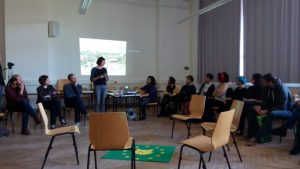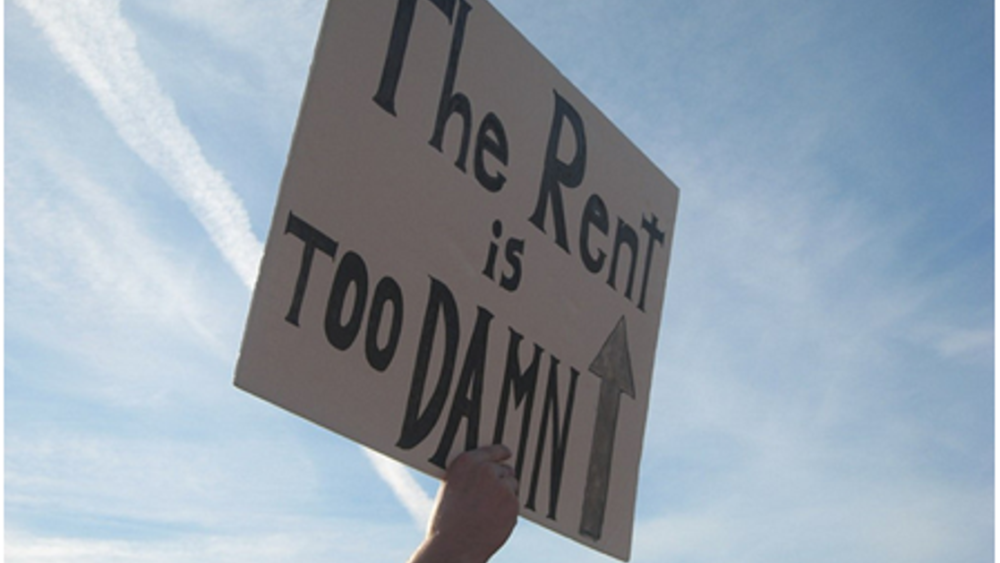Building Rebel Cities
The theoretical concept of ‘Rebel Cities’ is going back on the book ‘Right to the city’ of french philosopher Henri Lefebvre from 1968. The name ‘Rebel Cities’ is due to the social theorist David Harvey. He traced urban development back to global monetary flow. Large scale projects like the Elbphilharmonie in Hamburg or the airport Berlin-Brandenburg, for example, are built in big cities because international money is searching for profitable investment. In accordance with Harvey such investments are indication of housing bubbles and economic crisis.
Furthermore the book ‘Rebel Cities’ points out the social aspects of urban communities. City researchers like Andrej Holm and Dirk Gebhardt show that it is about “concrete use of urban spaces … and access to political and strategic debates about future development paths”. At the beginning of the ‘DiEM-Lab’ Martin Pairet, activist of DiEM25 and member of the organisation ‘European Alternatives’, called attention to how promising the concept of ‘Rebel Cities’ could proof. There are several possibilities to make it a reality. For example Barcelona and Naples have the shape of a rebel city. Both municipalities form there own “Lab” with their own history, experience and above all their specific population. What about Berlin?
Whereas water privatisation was stopped in Naples and the municipality is organising water supply itself, also people in Berlin call for a different development. Lisa Vollmer researches housing protests in Berlin and New York and represented the alliance “City from Below” at the ‘DiEM-Lab’. The alliance is communally and self-governed. Lisa gave a very informative talk about recent political events and the everyday struggles around the topics of rising rents, public property and eviction.
 City from below
City from belowCurrently the alliance is mainly dealing with the so called ‘Dragoner-Areal’ a former army compound in Friedrichshain-Kreuzberg. It demands, that the area as “inner-city open area is developed along the interests of local users”. But the 4.7 hectare big area was already sold in 2012 with highest-bidding of about 21 million Euro from the Institute for Federal Real Estate to the investor ABR German Real Estate. The investor was planning upscale owner-occupied flats, cooperative buildings and new constructions. According to the building law the development plan has to take regard to the thorough collection of all interests and their fair consideration. Above all a comprehensive participation of the public and all parties involved. But the district of Friedrichshain-Kreuzberg didn’t want to have that, which let to a withdrawal of German Real Estate to buy the area.
Therefor residents expressed “massive doubts about the promise of ‘affordable’ flats by a private investor” through a participation procedure. As a result the Institute for Federal Real Estate has again invited tenders through a highest-bidding contest. Within the rent city of Berlin (60 % of residents have right for social housing) is another group whose housing conditions are precarious: migrants.
Urban plurality
Max Hoßfeldt of the initiative ‘Give Something Back To Berlin’ (GSBTB) presented the work of his organisation at the ‘DiEM-Lab’. Just five years after its creation GSBTB is the biggest platform for neighbour initiatives and social employment in Berlin. It is dedicated to bring the big migrant community in Berlin to work together. GSBTB has hundreds of volunteers from over 60 countries. They differ from jetsetters to refugees and demand to “get involved”. This is an appeal to all people living in Berlin to build up communities and develop social projects. Already there are over 60 projects regarding different topics like centers for homeless people, mentor programs or creative children work. Today GSBTB can reach over 14.000 participants a year for their own refugee projects.
Christoph Wiedemann gave a different perspective on the topic escape and migration. He was in charge of an emergency accommodation for about 180 male refugees in Berlin. He reported about self organisation and self administration in that shelter. Some inhabitants argued to give rules to themselves and also to imply them whereas others had the opinion, with regard to the autocratic systems in their countries of origin, that the management of the shelter should give and imply the rules. Christoph pointed out that refugees are not a homogenous group and bring very different political opinions. Therefore alliances between democratic and progressive people with and without migration background are important.
Building Rebel Cities?
The organisators of ‘DiEM-Lab’ were excited about the event. Johannes Fehr, coordinator of the DiEM25 Spontaneous Collective (DSC) 1 in Berlin, said that it was a very convenient event. He learned how ‘City from Below’ is working and how it is challenging the municipal institutions. Johannes underlined the aspect of working together and above all, that “refugees should have the right to vote” and the “institutions involved in municipal politics should become more democratic”. Also another activist for DiEM25 in Berlin praised the “mix” of the inputs as well as the atmosphere of the get-together. All participants could conclude that more participatory rights for refugees are needed and many urban initiatives need political representation. For the future DiEM25 can learn that the specific European character of the movement is a main advantage. Urban problems are present in all European, yet all cities worldwide. To gather these problems and coordinate solutions will be a massive task for our future.
DSC Berlin
Do you want to be informed of DiEM25's actions? Sign up here










